Related Research Articles
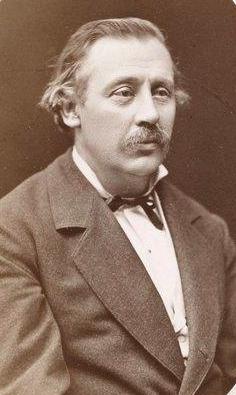
Gustav Ferdinand Richard Radde was a German naturalist and Siberian explorer. Radde's warbler and several other species are named after him.
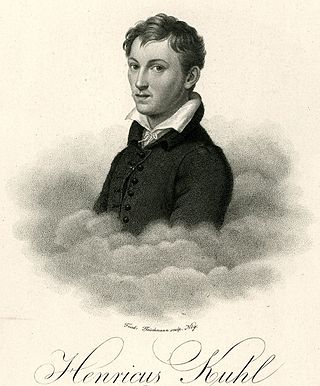
Heinrich Kuhl was a German naturalist and zoologist.
Claude Marie Jules Bourcier was a French naturalist and expert on hummingbirds.

Anton Reichenow was a German ornithologist and herpetologist.
Harald Meier was a German herpetologist.
Herbert George Flaxman Spurrell M.A. M.B. B.Ch. F.Z.S. was a British biologist, physician and author whose work in South America and Africa led to the discovery of several new species.

Ignaz Franz Werner Maria von Olfers was a German naturalist, historian and diplomat.

Theodore Sherman Palmer was an American zoologist.
Jivanayakam Cyril Daniel, or J. C., as he was known, was an Indian naturalist from Nagercoil, and the author of several acclaimed books on birds, mammals, and reptiles.

Jacques Vladimir von Bedriaga, sometimes Bedryagha was a Russian herpetologist who was a native of Kriniz, a village near Voronezh.
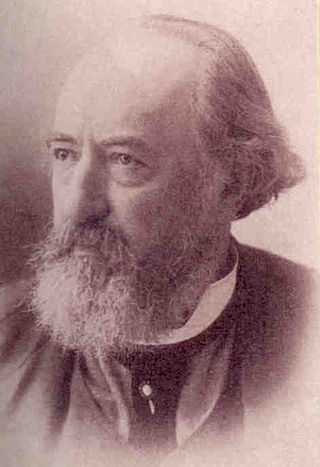
Michele Lessona was an Italian zoologist.
Johann Maria Hildebrandt was a German explorer, collector, and scientist.
Federico Carlos Lehmann Valencia was a Colombian ornithologist, plant collector, and conservation biologist.
Fritz Nieden (1883–1942) was a German zoologist who specialized in African herpetology.
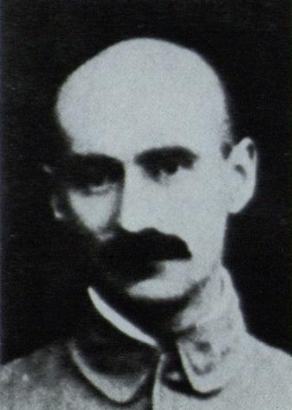
Rudolf Grauer was an Austrian explorer and zoologist.
Benjamin Shreve (1908–1985) was an American amateur herpetologist. He was from a wealthy Boston family of jewellers and worked at the Harvard Museum of Comparative Zoology as a volunteer. He was trained by Arthur Loveridge to deal with materials from elsewhere than Africa. Shreve described many species from the West Indies together with Thomas Barbour. In these papers, Shreve is said to have done the "spadework" while Barbour wrote "florid" introductions.
Charles Frost was an Australian author and collector of reptiles, frequently associated with the works of Arthur Henry Shakespeare Lucas.
Arthur Lennox Butler was a British naturalist. Born in Karachi, he became a curator of a natural history museum in Kuala Lumpur, Malaysia. He later became the superintendent of a game preserve in Sudan before returning to England. He is commemorated in the scientific names of four species of reptile, a bird, and an amphibian.
Perry Oveitt Simons was an American scientific collector. He predominantly worked in the Neotropics.
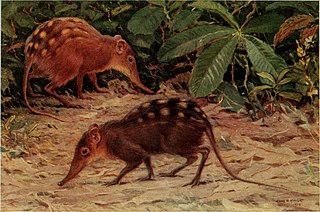
The Stuhlmann's sengi or white-tailed sengi is a species of elephant shrew that lives in the forests and savannas of Africa. It was discovered in 1893 and declared a new species. In the 1960s, however, it was downgraded to a subspecies of checkered sengi. In 2018, following genetic tests, scientists re-evaluated the mammal as a full species again.
References
- 1 2 3 4 5 Morrison, David (January 2014). "Review". Systematic Biology.
- 1 2 Velmala, William (July 2015). "A book of names – of birds and people:". Ornis Fennica.
- ↑ Sandwith, Margaret (2004). "Whose Bird? Men and Women Commemorated in the Common Names of Birds by Bo Beolens and Michael Watkins". Journal of African Ornithology.
- ↑ https://www.journals.uchicago.edu/doi/abs/10.1086/658462
- ↑ https://oaj.fupress.net/index.php/ah/article/view/1699/1699